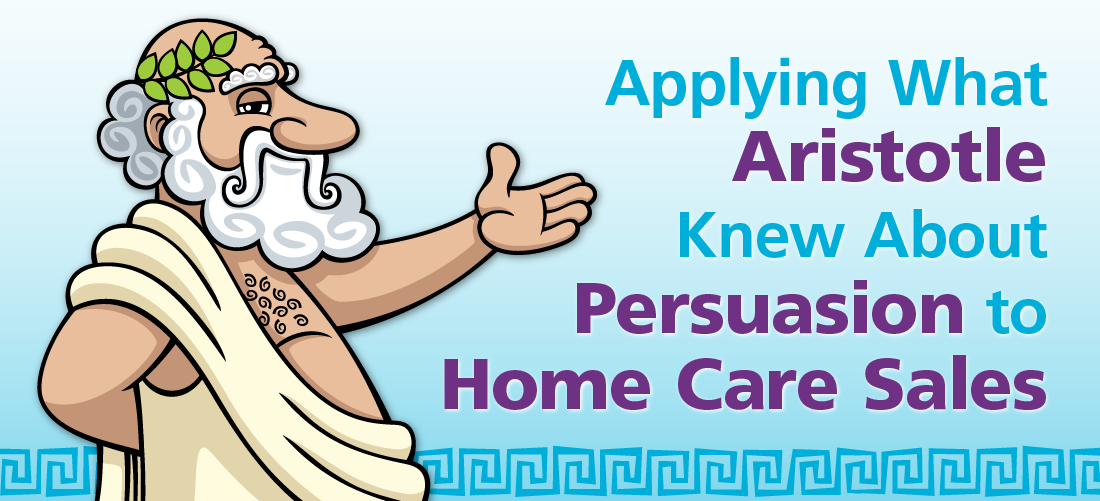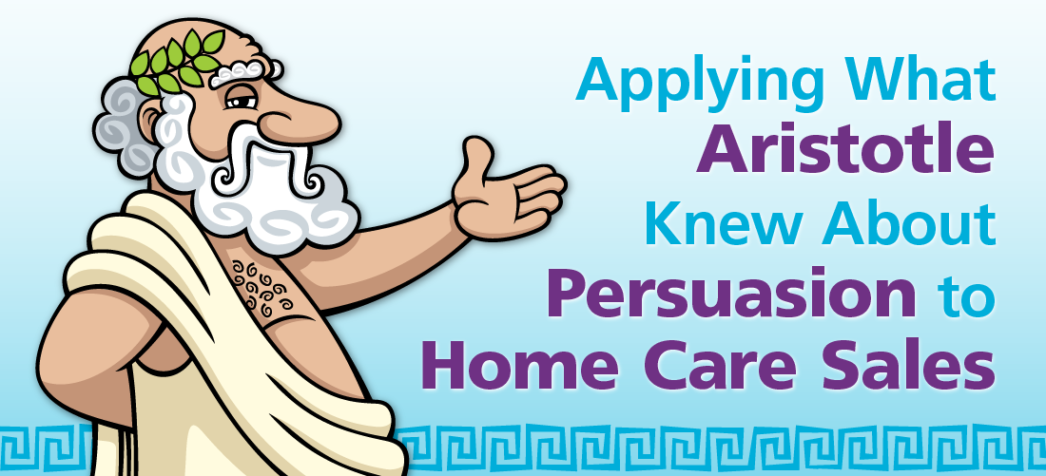
The home care industry is crowded and consumers have many options when it comes to finding care for a loved one. In home care sales, persuasion is a critical skill for gaining new clients. But persuasion is more than rehearsed responses to inquiry questions. Persuasion is about building trust with potential clients and referral sources, identifying the values of your audience, and positioning your agency as the best solution.
When leveraged artfully, persuasion is a powerful tool that helps a home care agency build relationships and influence growth. Persuasion is centered around four fundamental principles that are as relevant today as when Aristotle outlined them more than 2,000 years ago.
Ethos: Establishing Credibility and Building Trust
What motivates someone to pick up the phone and call to learn about your agency’s services? More than likely, it’s because that person has a loved one in need of care. The care needs may be urgent, following an unexpected hospitalization, or less urgent and based on a feeling that mom is struggling to do things on her own. An inquiry presents your agency with the opportunity to persuade the caller to use your services to meet care needs. No matter what the motivation for contacting your agency, callers are seeking someone who understands the issues they face.
Because initial contact typically takes place over the phone, callers cannot rely on visual cues and body language as they do in face-to-face interactions. To build trust and credibility, home care agency staff must connect through other means such as:
- A personal story about what inspires them to work in home care
- Sharing an uplifting caregiving experience
- Emphasizing that the agency employs caregivers from the local area
- Speaking with an empathetic tone
- Asking open-ended questions
- Active listening, or listening to understand versus listening to respond
When able to meet in person for an assessment or to network with a referral source, the same criteria for building trust and credibility remain critical. In addition, body language becomes an added tool for persuasion, as does projecting warmth and confidence about the services your agency provides.
Pathos: Making a Connection on an Emotional Level
People are persuaded to take action based upon pathos: the emotions felt when interacting with another person. Pathos plays an important role in the communication strategies used with potential clients and referral sources. While there is a right time to highlight facts and figures that set your agency apart from the competition, in the early stages of establishing a relationship with a potential client or a referral source, relatable stories around common care challenges are what bring people together. Emotion, or pathos, is the fuel that drives personal stories and helps make them relatable during a sales call. To help people feel confident in taking the next step with your agency, effective stories should rely heavily on connecting through:
- Relevant examples of senior care situations
- Demonstrating experience and expertise in solving problems related to senior care challenges
- Positioning your agency as an expert and solution
- Relating to the situation detailed by the caller
Logos: Demonstrating How Your Agency is a Solution
Logos is the aspect of persuasion that appeals to reason. For home care agencies, this means that when listening to what callers or referral sources are sharing, and the challenges they are facing, you look for opportunities to demonstrate how your home care agency can be the solution. In other words, identify the needs of your audience and present services in the form of a solution – from improved quality of life at home to improved health outcomes. When presenting this information, it’s important to:
- Demonstrate active listening
- Ask targeted questions to demonstrate experience
- Provide examples of how your agency has solved similar problems
- Present services as a solution to their problem
- Share relevant features and benefits
- Respond to objections by demonstrating value
In demonstrating value and experience, it is also appropriate to share data with callers and referral sources that back up your claims about the agency. Data, like the results of client and caregivers satisfaction surveys, can provide important context, but should not drive the call.
Brevity: Providing Information Without Overwhelming
When it comes to mastering the art of persuasion, less is more. While it can be easy to fall into the trap of detailing all of the services the agency offers, or to lay out information about how your agency is equipped to handle the care needs of a person as they progressively need more assistance, this can overwhelm callers. Instead, listen and agree to meet their most current, pressing needs. Avoid reciting a laundry list of home care services your agency offers. Instead, share how your agency help by building trust (ethos), connecting on an emotional level (logos), and by demonstrating how your agency is a solution (logos).
While home care is a professional connection between care recipients, caregivers, and the home care agency, the actual relationship is much deeper. Families are trusting that your agency can meet the care needs of their loved one with expertise and compassion. Referral sources are trusting that your agency can professionally meet the care needs of their clients and help them achieve wellness goals. In both cases, trust is the foundation upon which these relationships are built.
For home care agencies, developing trust begins with the inquiry call. Ensuring that staff has the sales training necessary to handle every inquiry call correctly is critical to success. corecubed offers a variety of services to help agencies fine-tune each step of the sales process, including inquiry management training, inquiry call evaluation, and much more.
Understanding how persuasion works can help home care agencies achieve the growth they seek and stand apart from the competition. To learn more effective home care sales strategies, reach out to corecubed. Our home care sales coaches bring extensive industry experience and can create customized sales training sessions designed specifically for your team.
For more information about how our homecare sales and marketing services can help your agency master the art of persuasion, reach out to us today at 800.370.6580 x1.
Learn How to Boost Your Caregiver Recruitment Efforts
 Recruiting and retaining top talent has long been a major hurdle for home care agencies. Since the pandemic began, the number of older adults in need of care at home has exploded, and many agencies are finding the need to turn away clients due to caregiver shortages.
Recruiting and retaining top talent has long been a major hurdle for home care agencies. Since the pandemic began, the number of older adults in need of care at home has exploded, and many agencies are finding the need to turn away clients due to caregiver shortages.
Discover some of the latest statistics from the 2020 Home Care Pulse Benchmarking Study, and some key tactics to implement today to meet the growing demand for the services you provide.

